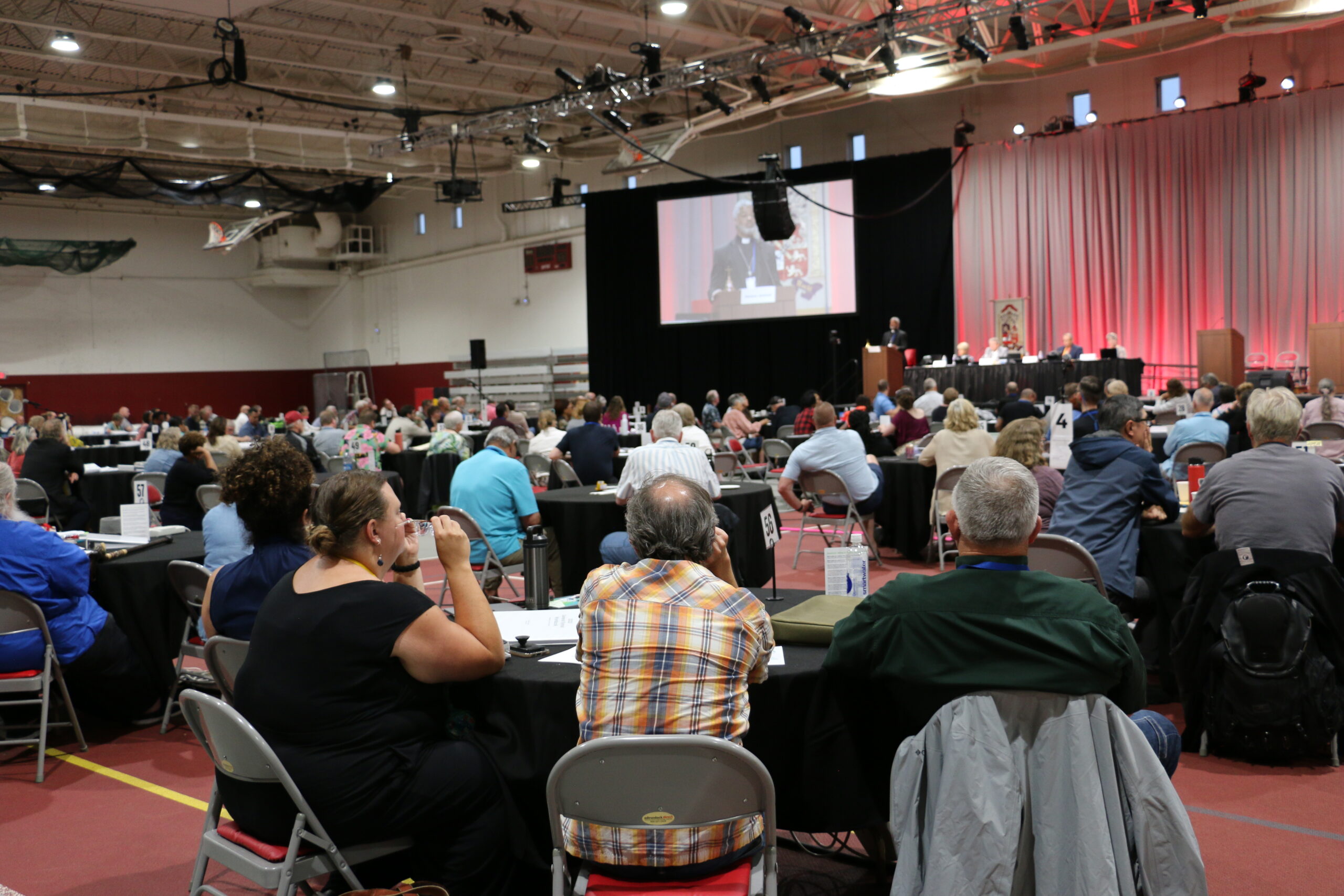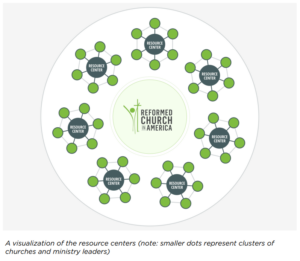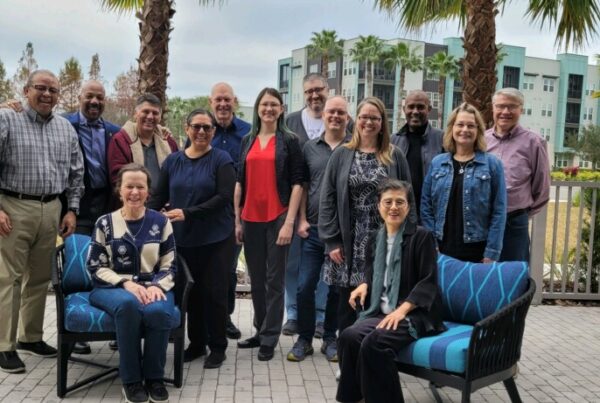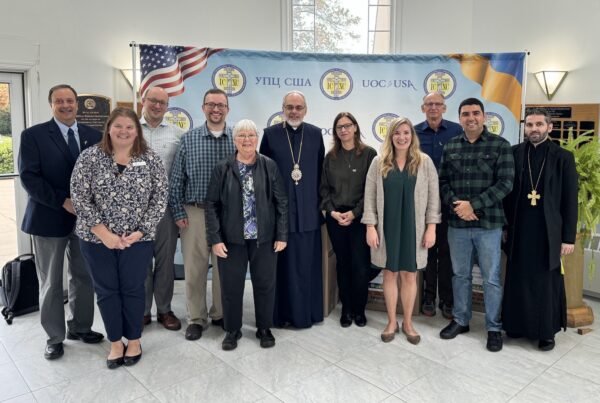On Friday, the restructuring team presented an interim report to General Synod, as instructed by last year’s synod. The team will make a final report and subsequent recommendations to General Synod 2024.
The work of the restructuring team is to propose changes to the denomination’s organizational structure that better allow for living in tension. For a full overview of the responsibility of this team, visit the restructuring team webpage.
Restructuring team members Michelle Chahine and Gildo Vieira presented an overview of the work of the team to date, the values and outcomes that have emerged from that work, and the first draft of a restructuring plan for delegates to review together.
Chahine and Vieira reported that the team believes the focus for the RCA in the future will be on making disciples. They defined characteristics of what it means to make disciples, as well as the traits of disciple-making communities. These traits can be found on the first page of their report.
Vieira shared the principles and goals the team identified to guide its work:
Principles
- Reformed
- Missional
- Aligned
- Diverse
- Adaptive
- Efficient
Goals
- Centering on God’s mission together, locally and globally
- A local focus so that our whole system supports the local church and ministries
- A robust structure for pastor/leader care that includes opportunities to grow and develop as leaders as well as be cared for and caring for other leaders
- A clear system that embraces diversity while holding one another accountable
- More flexibility in credentialing our pastors and elders without lowering our standards
- Increased, efficient communication internally and externally
- A new mental model on assessments and how we conduct business
Guided by the principles and goals that emerged, the team drafted a restructuring plan that involves three primary proposals.
Draft proposals
Proposal 1: Move to global leadership and resource centers with clusters of churches and ministries
- Resource center: Primary assembly, responsible for credentialing and ordaining ministers and commissioned pastors, equipping churches, and functioning as a judiciary.
- Global leadership council: Secondary assembly, serving as the denominational executive board.
- Clusters: Groups of churches and ministry leaders within a resource center, serving as a network for relational support.
Proposal 2: Move to more frequent local gatherings with less frequent global gatherings
- Resource centers would hold annual business meetings, using a consensus model for decision-making rather than Robert’s Rules of Order.
- Global leadership gatherings would happen every three to four years. The focus would be on worship, prayer, preaching, and equipping, with no decision-making business on the agenda.
Proposal 3: Create a Biblically-based system for accountability and discipline
- The policies would be based on the process outlined in Matthew 18, with a sought outcome of reconciliation in each case.
- The resource centers would be the primary judicatories.
While there are other items in consideration, from changes to the Book of Church Order, to the title and role of the general secretary, the team needs more time and feedback from others before addressing those topics.
Process at General Synod
Delegates had received the team’s draft in advance for review. On Saturday morning, delegates had time to share feedback in facilitated discussion groups. As the presenters sent the delegates into their feedback groups, the delegates were encouraged to go with a sense of curiosity and continued imagination, trusting that God is preparing the way. “Don’t hold things too close, because this is God’s, and we’re part of this plan,” said Chahine.
Though no plenary discussion was originally planned, the synod voted on Thursday to add time to the agenda for Saturday evening so the draft proposals could be considered as a full assembly. The initial framework for this additional session was to allow 30 minutes for table discussions, and 30 minutes for discussion addressed to the president with the entire assembly. However, at the beginning of this session, the synod voted to allot the full hour to full assembly discussion, with no table discussion.
The time of plenary discussion was significant, with delegates expressing gratitude for the work of the restructuring team, as well as bringing insights, concerns, and affirmations. Among a wide variety of comments, discussion returned to a few themes: the implications of being a global denomination, the value of discernment at the local level versus within the broader gathered assembly, and the merits of moving to a consensus-based decision making structure. Others expressed a desire for patience, clarity, and transparency through the process. To hear all comments from the delegates, watch the livestream of the evening session.
Monday afternoon, the synod again discussed restructuring when considering the report of the Advisory Committee on Overtures and New Business.
The synod approved a recommendation aimed at strengthening the team’s communication over the next year, instructing the restructuring team “to review their process to ensure there are adequate opportunities for all parties to provide input and to continue to strive for open, transparent, and communicative conversation.”
Delegates also instructed the restructuring team to “consult with the Commission on Theology, the Commission on Church Order, and the General Synod professors of theology around the issue of practical theology as the formal expression of our doctrinal convictions.”
The delegates held a brief discussion regarding the evaluation of the two systems of government at work within the RCA (“the centralized and directed government of the General Synod Council [through Carver governance] and the widely conversational and bottom-up government of our historic polity”), and requested the Commission on Church Order to review the systems and bring recommendations to the synod in 2025.
Delegates debated at length a motion to extend the work of the restructuring team by a year, but ultimately voted it down.
Process moving forward
The restructuring team also offered the General Synod a timeline of their continued work:
June 2023: General Synod receives and discusses the draft of version 1 of the team’s recommendation.
September 2023: Restructuring team meets in person and will draft version 2.
October to December 2023: Second round of in-person roundtable discussion gatherings.
January 2024: Restructuring team meets in person and will draft version 3 based on the feedback they have received.
February to April 2024: Third round of in-person roundtable discussion gatherings.
June 2024: Restructuring team offers their final report and recommendations to General Synod.






